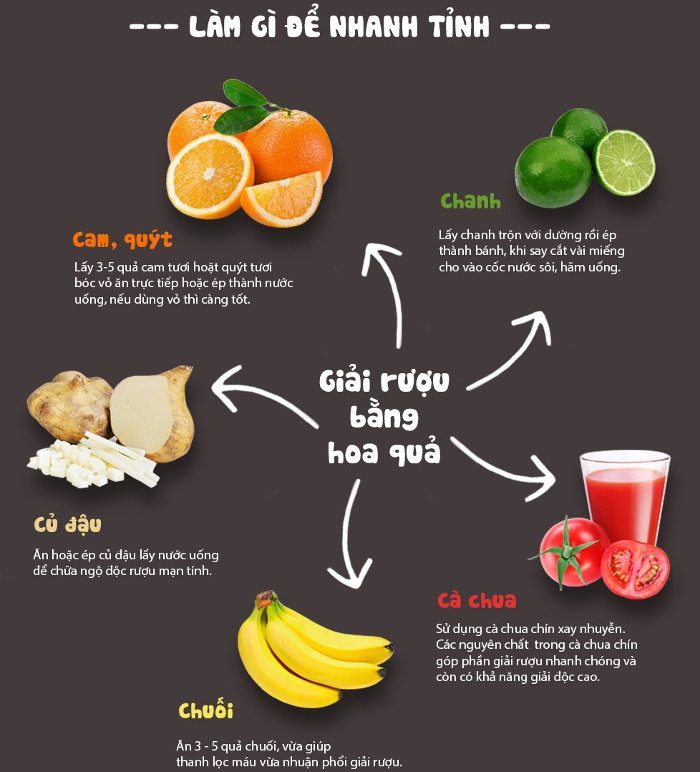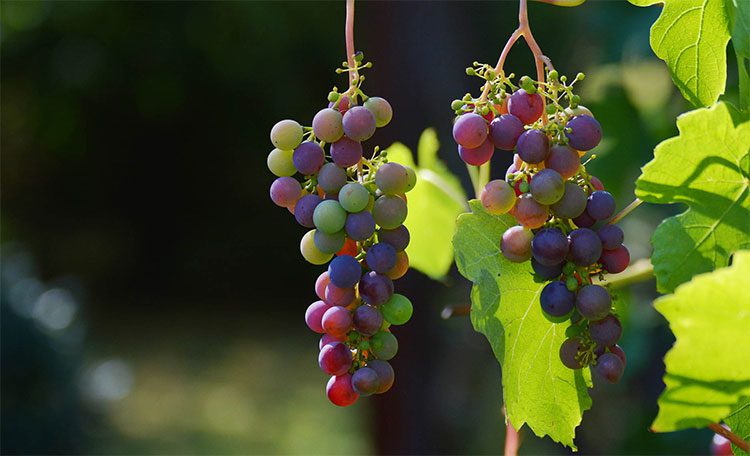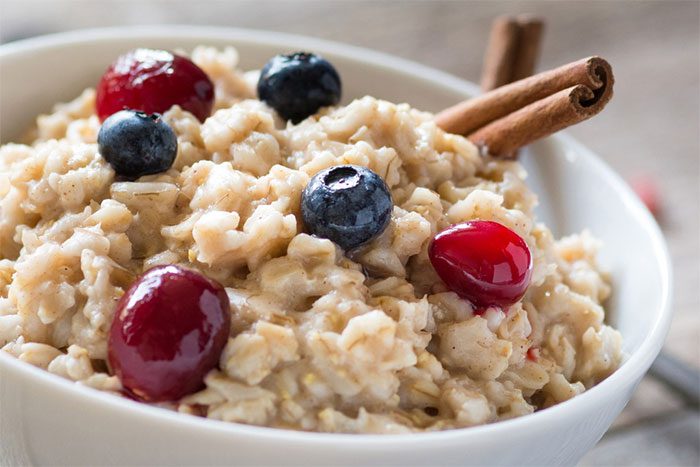Longan, lychee, and garlic are foods to avoid for those who are intoxicated. So, what should you eat to quickly regain your composure?
Master and Doctor Hoàng Khánh Toàn, Head of the Traditional Medicine Department at Central Military Hospital 108, states that intoxication is an acute poisoning condition caused by excessive alcohol consumption.
Under the influence of alcohol, the cerebral cortex is inhibited, leading to behavioral disturbances, uncontrollable laughter and speech, a heavy head, blurry vision, unsteady walking, and vomiting. Some individuals may exhibit cold skin, rapid breathing, and can even reach critical conditions due to cerebral hemorrhage, myocardial infarction, and dangerous traffic accidents.
When in this troublesome state, according to traditional medicine, intoxicated individuals should consume foods that have cooling and nourishing properties, to quench thirst and transform phlegm, aiming to relieve intoxication and prevent unwanted complications.
Pear: Cool in nature, sweet in taste, and effective in cooling and nourishing. Eating pears can quickly alleviate the feeling of dry mouth and thirst, as well as discomfort in the chest and abdomen.
Apple: Cool in nature, sweet in taste, it helps to nourish and alleviate discomfort, quench thirst, and relieve intoxication. For the best effect, it is recommended to eat fresh apples or drink freshly squeezed apple juice.
Orange: Cool in nature, with a sweet and sour taste, it helps nourish, quench thirst, and relieve intoxication while promoting urination. Oranges can eliminate heat toxins in the digestive tract, quench thirst, promote urination, and relieve intoxication.

Some fruits are very effective in relieving intoxication.
Chestnut: It helps to clear the lungs, soothe the throat, nourish, and relieve intoxication. When intoxicated, consume 10 fresh chestnuts, removing the seeds, and boil them to drink the water.
Buddha’s hand: Ancients believed that Buddha’s hand is a medicinal herb with aromatic properties, effective in stimulating digestion, eliminating phlegm, stopping vomiting, and relieving intoxication. When intoxicated, use 12-15 grams of fresh Buddha’s hand (or 6 grams dried) steeped in boiling water, and drink it instead of tea.
Plantain banana: Cold in nature, sweet in taste, it helps to cool, moisten the intestines, quench thirst, and relieve intoxication.
Calamondin: It functions to relieve discomfort, provide a refreshing feeling in the chest, quench thirst, and relieve intoxication, especially if the peel is used.
Lemon: Cool in nature, sour in taste, it also helps relieve intoxication. Mix lemon with sugar, then press into a cake; when intoxicated, cut a few pieces into hot water, steep, and drink as lemon has the ability to “eliminate stubborn phlegm, relieve discomfort, harmonize the stomach, open the appetite, relax the body, strengthen the spleen, and relieve alcohol.”
Cane juice: Cold in nature, sweet in taste, it helps to cool, nourish, and relieve intoxication. However, when intoxicated, it is best to use freshly pressed cane juice rather than refined sugar from cane, as refined sugar is warming and can accumulate heat if consumed in large amounts.
Radish: It effectively relieves sour swallowing, stagnation, relieves intoxication, and disperses blood stasis. When intoxicated, consume fresh radish or drink its juice.
Yam bean: Cool in nature, sweet in taste, it has nourishing and thirst-quenching properties and helps relieve intoxication. Drinking yam bean juice daily is recommended for chronic alcohol poisoning.
Tea: Tea can detoxify alcohol and food, refresh the spirit, and clear the mind. Modern research indicates that caffeine in tea leaves enhances the liver’s detoxification function, helping the body excrete alcohol through urine quickly.
Honey: The Royal Society of Chemistry states that fructose in honey helps the body break down into harmless byproducts and reduces headaches, especially those caused by drinking wine.

Eating grapes before drinking will help you avoid intoxication.
Grapes: Both red and green grapes contain tartaric acid. When combined with ethanol in alcohol, tartaric acid forms esters that induce vomiting and relieve intoxication. Eating grapes before drinking will help you avoid intoxication.
Tomato juice: After drinking, the body loses a certain amount of sugar in the blood, leading to fatigue and dizziness as blood sugar is the energy source for brain activity. To counteract this, drink a glass of tomato juice to replenish fructose. The lycopene pigment in tomatoes also has effective anti-inflammatory properties.
Coconut water is a low-sugar beverage with low calories but rich in electrolytes, minerals, antioxidants, and appropriate nutritional content, providing many benefits. This mildly sweet drink acts as a diuretic, helping us urinate more frequently, thereby gradually eliminating alcohol from the body. Additionally, coconut water helps rehydrate the body, preventing dehydration caused by alcoholic beverages.
Ginger: Ginger is often used in many Vietnamese dishes. Moreover, it has various benefits such as relieving stomach pain, preventing motion sickness, and promoting relaxation. Ginger’s warming properties help blood circulation, making it effective in relieving intoxication, allowing alcohol to be metabolized quickly. To use ginger, prepare a fresh ginger root, slice it, boil it in water for about 10 minutes, and it is ready to drink. For added flavor, you can mix in a little honey.

Ginger has warming properties that help blood circulation, making it effective in relieving intoxication, allowing alcohol to be metabolized quickly.
Green beans: Dr. Kiều Nga, Head of the Examination Department at Bình Dương Traditional Medicine Hospital, states that green beans are sweet, slightly cold, and have cooling properties. The outer husk of green beans is sweet, cool, and non-toxic. Green beans are known for their heat-clearing and detoxifying properties, making them very effective in relieving alcohol intoxication. There are many ways to prepare green beans for detoxification; you can cook green bean porridge or mix green bean water to drink. Eating a few bowls of green bean porridge helps induce sweating. This porridge is not only good for digestion but also helps intoxicated individuals overcome discomfort and fatigue after drinking.
Arrowroot powder: Arrowroot powder is a beverage enjoyed by many. According to Dr. Nga, it is starch from arrowroot tubers, sweet, cool, and neutral, entering the spleen, stomach, lungs, and bladder meridians. Arrowroot powder is a refreshing drink with many health benefits such as cooling, nourishing fluids, eliminating heat, promoting urination, inducing sweating, and detoxifying. Especially, arrowroot powder is very effective in relieving intoxication if used correctly. You can mix arrowroot powder with lemon and sugar. Add 200 ml of water to a glass, then stir in the arrowroot powder until dissolved, and add sugar to taste.
Eggs: The protein from eggs can mitigate the side effects during the body’s alcohol metabolism process. Besides being delicious and versatile in preparation, eggs are rich in cysteine, which helps restore glutathione levels in the body and alleviates nausea after consuming alcohol.
Spinach is a food rich in folic acid, vitamin K, and chlorophyll, thereby accelerating metabolism and restoring nutritional levels in the body after consuming alcoholic beverages.

Oats help reduce nausea symptoms and stabilize blood sugar…
Oats are a complex carbohydrate that contains a lot of fiber along with high levels of minerals, vitamins, and antioxidants. Thus, oats help reduce nausea symptoms and stabilize blood sugar by providing slowly absorbed sugars, improving fatigue.
Lean meat: Alcohol inhibits the body’s absorption of certain amino acids, which can contribute to symptoms of intoxication such as fatigue and mood swings. Since our bodies break down protein into amino acids, protein-rich foods are a good choice to combat intoxication. Choose lean meats and supplement nutritious vegetables in meals for added health benefits.
Avocado: Avocados are an excellent source of electrolytes and potassium, often depleted when drinking alcohol. Additionally, avocados increase satiety, boost energy, and contribute to a healthy digestive system. Eating bread with a few slices of avocado is an effective and delicious way to alleviate intoxication while providing some carbohydrates from the bread.
Soup: Chicken broth or vegetable broth can provide essential nutrients and water, while also being good for the stomach. A bowl of chicken soup is a perfect remedy for intoxication as it is high in sodium and electrolytes, not to mention it also contains vegetables and protein.
Seeds like almonds, walnuts, and cashews are rich in magnesium, helping the body balance elements in the blood and thus preventing discomfort after sobering up.
Artichoke tea: Artichoke tea has detoxifying properties due to components like cynarin, inulin, and flavonoids. These substances stimulate the liver to increase bile production, thereby enhancing liver function and promoting the expulsion of toxins caused by alcohol.
However, it is important to note that some studies suggest that artichokes do not actually reduce the toxicity of alcohol on the liver but can only help alleviate the uncomfortable symptoms caused by intoxication. Therefore, artichoke tea is not a complete antidote for alcohol but rather a supportive measure.
Water: Drinking water before, during, and after consuming alcohol will help accelerate the process of eliminating alcohol from the body.
Alcoholic beverages act as diuretics, which can lead to dehydration and loss of electrolytes in the body. Therefore, when consuming alcohol, it is essential to replenish water to compensate for the lost fluids. The amount of water needed varies depending on individual requirements.
Important Tips for Sobering Up
It is crucial to avoid yogurt for sobering up as its components can irritate the stomach, leading to diarrhea. Instead of yogurt, you can use fresh milk to help with sobering. Drinking fresh milk about 30 minutes before consuming alcohol will form a protective layer in the stomach lining.
Additionally, strong tea is not suitable for sobering up. The combination of tea and alcohol can put pressure on the heart, potentially causing arrhythmias or even heart failure. Strong tea also hinders the metabolism of alcohol and can harm the kidneys.
Moreover, traditional remedies for sobering up often include various fruits and vegetables such as watermelon, cucumber, melon, mung bean soup, mustard greens, fresh lotus stems, and coffee… Those who are intoxicated should avoid eating lychee, jujube, longan, black pepper, onions, garlic, cinnamon, chili, ginseng, western ginseng, and astragalus.


















































